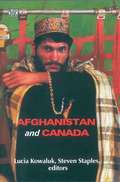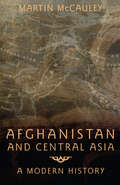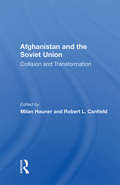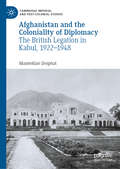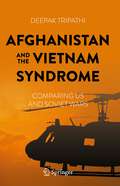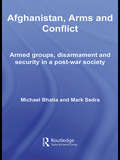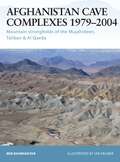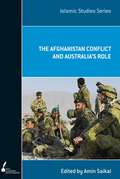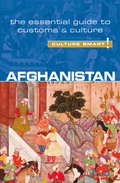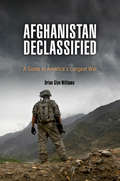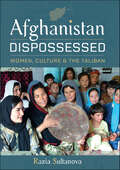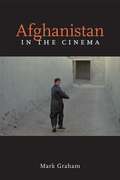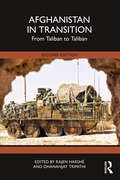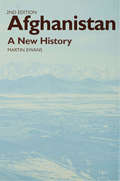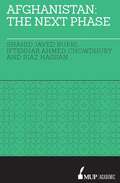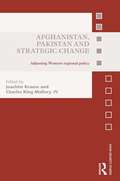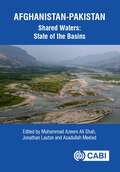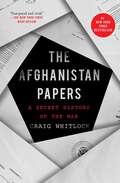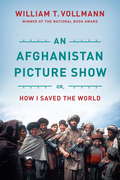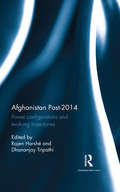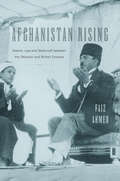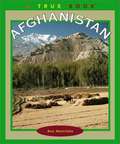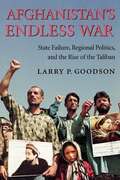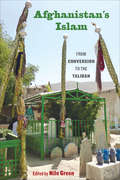- Table View
- List View
Afghanistan and Canada
by Lucia Kowaluk Steven StaplesThousands of foreign troops have been fighting a seemingly endless war in Afghanistan. Billions of dollars of foreign aid have been poured into the country. Thousands of military and civilian causalities are the tragic human cost. International observers report that corruption is rampant. A new Taliban insurgency is active. In Canada an unprecedented public concern has emerged; a majority of Canadians want to end Canada's currently defined military involvement there.A number of Canada's top political analysts have contributed essays, including Peggy Mason, Linda McQuaig, Michael Neumann, James Laxer, Murray Dobbin, and Michael Byers.Lyle Stewart is a journalist who has worked for the Montreal Gazette and the CBC.
Afghanistan and Central Asia: A Modern History
by Martin MccauleyThe Afghan crisis has grabbed the attention of the entire world, and underlined the desperate need in the West for a better understanding of the region and its challenges in the face of increasingly militant interpretations of Islam. Carved up and fought over by the British and Tsarist Russia in the nineteenth century, and under Soviet domination for much of the twentieth, the lonely passes, deserts and peoples of the five Central Asian republics have remained shrouded in obscurity. Even Afghanistan, the site of almost constant conflict since the Soviet invasion of 1978, is little known beyond the media images of the Islamic fundamentalist Taliban movement. Martin McCauley draws on his vast knowledge of the region and its history to provide a clear and highly readable account of Afghanistan and the Central Asian republics of Kazakhstan, Kyrgyzstan, Tasikistan, Turkmenistan, Uzbekistan, from their medieval pasts to the unpredictable present. Illuminating languages and landscapes, cultures and society, he examines the rise of militant Islam and its impact on the region, the push and pull of global economics and politics, and possibilities for stability in an inherently unstable part of the world.
Afghanistan And The Soviet Union: Collision And Transformation
by Milan HaunerSince the dramatic events of a decade ago-the revolutions in Kabul and Teheran, the Soviet invasion of Afghanistan, and the Gulf War- "Greater Central Asia" has recaptured the imagination of academia. Historians, Islamicists, anthropologists, political scientists, and defense analysts began to convene conferences and to produce collective volumes that concentrated on two seemingly unrelated subjects: the continuity and strength of ethnocultural patterns in Muslim Central Asia, on the one hand, and the limited range of U.S. military options for defense of the oil-rich Gulf region against hypothetical Soviet invasion, on the other. The contributors to this volume were asked to focus on the long term significance of the junction between Afghanistan and Soviet Eurasia through the "Midlands" region-a relationship that could have wide implications.
Afghanistan and the Coloniality of Diplomacy: The British Legation in Kabul, 1922–1948 (Cambridge Imperial and Post-Colonial Studies Series)
by Maximilian DrephalThis book offers an institutional history of the British Legation in Kabul, which was established in response to the independence of Afghanistan in 1919. It contextualises this diplomatic mission in the wider remit of Anglo-Afghan relations and diplomacy from the nineteenth to the twenty-first century, examining the networks of family and profession that established the institution’s colonial foundations and its connections across South Asia and the Indian Ocean. The study presents the British Legation as a late imperial institution, which materialised colonialism's governmental practices in the age of independence. Ultimately, it demonstrates the continuation of asymmetries forged in the Anglo-Afghan encounter and shows how these were transformed into instances of diplomatic inequality in the realm of international relations. Approaching diplomacy through the themes of performance, the body and architecture, and in the context of knowledge transfers, this work offers new perspectives on international relations through a cultural history of diplomacy.
Afghanistan and the Vietnam Syndrome: Comparing US and Soviet Wars
by Deepak TripathiGreat powers have often found that military adventurism to force their will in distant lands comes with the risk of spending excessive military, economic, and moral capital to the extent that war is no longer sustainable. Written by a former BBC Afghanistan correspondent who set up the corporation’s bureau in Kabul in the early 1990s, this book draws both from scholarly knowledge as well as first-hand insights on how the Americans met that fate in Vietnam, and the Soviets and Americans in Afghanistan. America’s 1975 retreat from Vietnam was a consequential event, prompting US commentators to explain it as reluctance to get involved in foreign wars, a mindset described as the Vietnam Syndrome. As Deepak Tripathi points out, the Vietnam experience made the Americans determined to give the Soviets their own Vietnam. The 1979 Soviet invasion of Afghanistan, and retreat after a decade of occupation, represented the revenge America sought. However, President George W. Bush’s decision to invade Afghanistan after the 9/11 attacks was the beginning of a long military venture that ended in retreat in 2021. Addressing an academic as well as a general audience, Tripathi explores parallels between wars in Afghanistan and Vietnam, and shows how the United States and the Soviet Union met the same fate.
Afghanistan, Arms and Conflict: Armed Groups, Disarmament and Security in a Post-War Society (Contemporary Security Studies)
by Michael Vinay Bhatia Mark SedraThis is the first book to provide a comprehensive assessment of small arms and security-related issues in post-9/11 Afghanistan. It includes case studies which reveal the findings of in-depth field research on hitherto neglected regions of the country, and provides a distinctive balance of thematic analysis, conceptual models and empirical research. Exploring various facets of armed violence and measures to tackle it, the volume provides significant insight into broader issues such as the efficacy of international assistance, the ‘shadow’ economy, warlordism, and the Taliban-led insurgency. In an effort to deconstruct and demystify Afghanistan’s alleged ‘gun culture’, it also explores some of the prevailing obstacles and opportunities facing the country in its transition period. In so doing, the book offers valuable lessons to the state-builders of Afghanistan as well as those of other countries and regions struggling to emerge from periods of transition. This book will be of much interest to all students of Afghanistan, small arms, insurgency, Asian Studies, and conflict studies in general.
Afghanistan Cave Complexes 1979-2004
by Ian Palmer Mir BahmanyarFollowing the Soviet invasion in 1979, the Mujahideen defenders of Afghanistan developed and reinforced many natural cave systems to use as supply bases and defensive positions. The Taliban and Al Qaeda further strengthened these positions in the 1990s. Following the events of September 11, 2001, these cave systems have once more come to prominence and sites such as Tora Bora and Zhawar Kili have featured in news headlines around the world. This title provides an analysis of these caves and underground systems, and discusses the U.S.-led Coalition's tactical approach to dislodging the enemy from these fortified positions.
Afghanistan Conflict and Australia's Role (Islamic Studies Series)
by Amin SaikalA decade after the US-led invasion of Afghanistan in October 2001, the country continues to face a growing insurgency and crises of governance. The Afghanistan Conflict and Australia's Role tackles a number of critical dimensions-politics, society, military, and reconstruction-of this conflict from a range of perspectives.This book unpacks the nature and complexity of the conflict at national and international levels. It makes a critical assessment of the performance of President Hamid Karzai and his government, and the efforts made by the international community, the US and its NATO and non-NATO allies in particular, to stabilise, rebuild and secure Afghanistan as a viable state. In addition, it examines critically the role played by Australia in the conflict.The conclusions are far-reaching, with relevance to anyone interested in the interconnectedness of many contemporary issues-governance, democratisation, development, the role of the media, and counterinsurgency. Islamic Studies Series - Volume 8
Afghanistan - Culture Smart!
by Moska Najib Nazes AfrozAfghanistan is situated at the crossroads of Asia, a strategically important location that connects the Middle East with Central Asia and the Indian subcontinent. Down the ages it has been subjected to continuous foreign invasion and intervention--from Alexander the Great to Genghis Khan, and as a pawn in the struggle between the British and Russian Empires--making its people wary of outsiders. That history is being repeated in the twenty-first century. Afghanistan has always been seen from the outside as a realm of much intrigue and many myths. The Afghans tried to keep their distance from the outside world--especially from the Europeans who, whether in pursuit of imperial goals or simply as explorer-travelers, attempted to enter and traverse the land. Their very elusiveness attracted Westerners to this landlocked country of high mountains and breathtaking beauty, where age-old customs and traditions were zealously guarded, sometimes at the cost of many lives. The Afghan people are a tapestry of ethnicities woven over time--Pashtuns, Tajiks, Hazaras, Uzbeks, and many smaller ones. Society is organized mainly along ethnic and tribal lines, but ethnic identity becomes irrelevant when a common enemy threatens to take control of the country. There are also many shared values and unwritten codes of conduct that govern interpersonal relations, which are not taken lightly. Visitors are struck by the simplicity, hospitability, dignity, and generosity of the Afghan people, and often confounded by customs that they find hard to understand. Culture Smart! Afghanistan is a unique introduction to the background, habits, traditions, idiosyncrasies, suspicions about foreigners, and patterns of behavior of the Afghan people. It offers visitors invaluable information and insights that will help them to interact with Afghans, to interpret their behavior, and to behave appropriately in their company, whether in personal or business exchanges. Once the ice is broken, the rewards will be great.
Afghanistan Declassified
by Brian Glyn WilliamsNearly 100,000 U.S. soldiers are deployed to Afghanistan, fighting the longest war in the nation's history. But what do Americans know about the land where this conflict is taking place? Many have come to have a grasp of the people, history, and geography of Iraq, but Afghanistan remains a mystery.Originally published by the U.S. Army to provide an overview of the country's terrain, ethnic groups, and history for American troops and now updated and expanded for the general public, Afghanistan Declassified fills in these gaps. Historian Brian Glyn Williams, who has traveled to Afghanistan frequently over the past decade, provides essential background to the war, tracing the rise, fall, and reemergence of the Taliban. Special sections deal with topics such as the CIA's Predator drone campaign in the Pakistani tribal zones, the spread of suicide bombing from Iraq to the Afghan theater of operations, and comparisons between the Soviet and U.S. experiences in Afghanistan.To Williams, a historian of Central Asia, Afghanistan is not merely a theater in the war on terror. It is a primeval, exciting, and beautiful land; not only a place of danger and turmoil but also one of hospitable villagers and stunning landscapes, of great cultural diversity and richness. Williams brings the country to life through his own travel experiences--from living with Northern Alliance Uzbek warlords to working on a major NATO base. National heroes are introduced, Afghanistan's varied ethnic groups are explored, key battles--both ancient and current--are retold, and this land that many see as only a frightening setting for prolonged war emerges in three dimensions.
Afghanistan Dispossessed: Women, Culture & the Taliban
by Razia SultanovaA focused history of women and popular culture in Afghanistan from the Soviet invasion, to 9/11, to the Taliban's takeover.How does normal social, cultural, religious life survive in constant turmoil? How can the people flourish? These basic questions are examined and answered by Razia Sultanova's academic analysis and deep fieldwork, with extensive eyewitness and personal contacts and conversations with a wide variety of Afghan men and women. She looks at basic questions of gender, identity, nation, tradition, history, popular culture and especially the role of music - classical, popular, modern and contemporary - as a vital element for survival. And all is over-shadowed by the Taliban with on-going threat of terror and repression especially for women and girls. Here is a classical story of a people's struggle for everyday normality and preservation of cherished traditions in a war-torn society.
Afghanistan in the Cinema
by Mark GrahamIn this timely critical introduction to the representation of Afghanistan in film, Mark Graham examines the often surprising combination of propaganda and poetry in films made in Hollywood and the East. Through the lenses of postcolonial theory and historical reassessment, Graham analyzes what these films say about Afghanistan, Islam, and the West and argues that they are integral tools for forming discourse on Afghanistan, a means for understanding and avoiding past mistakes, and symbols of the country's shaky but promising future. Thoughtfully addressing many of the misperceptions about Afghanistan perpetuated in the West, Afghanistan in the Cinema incorporates incisive analysis of the market factors, funding sources, and political agendas that have shaped the films. The book considers a range of films, beginning with the 1970s epics The Man Who Would Become King and The Horsemen and following the shifts in representation of the Muslim world during the Russian War in films such as The Beast and Rambo III. Graham then moves on to Taliban-era films such as Kandahar, Osama, and Ellipsis, the first Afghan film directed by a woman. Lastly, the book discusses imperialist nostalgia in films such as Charlie Wilson's War and destabilizing visions represented in contemporary works such as The Kite Runner.
Afghanistan in Transition: From Taliban to Taliban
by Rajen Harshé Dhananjay TripathiOwing to its geo-strategic location and mineral wealth, Afghanistan has acquired significance in the inter-state politics of Asia as well as world politics during the past decades. This book discusses the Taliban’s return which outlines the recent and current developments in contemporary Afghanistan. The essays in this volume: Locate Afghanistan under globalisation and reflect on the state and nation-building efforts in Afghanistan by shedding light on the status of citizens, especially women Analyse how the Taliban survived in all these years, and how it returned to power Examine Afghanistan’s relations with major powers like the USA, China, and India and explore the intricacies of ties between India, Pakistan, and Afghanistan within the Indian subcontinent Shedding light on a threshold moment in 21st Century world politics, this work will be useful to scholars and researchers in political science, international relations, sociology, area studies, and the interested general reader.
Afghanistan - A New History
by Sir Martin Ewans Martin Ewans Patrick Weber Robyn CarrSir Martin Ewans, former Head of the British Chancery in Kabul, puts into an historical and contemporary context the series of tragic events that have impinged on Afghanistan in the past fifty years. The book examines the roots of these developments in Afghanistan's earlier history and external relationships, as well as their contemporary relevance
Afghanistan: The Next Phase
by Shahid Javed Burki Iftekhar Ahmed Chowdhury Riaz HassanAfghanistan: The Next Phase takes an in-depth look at the present situation in Afghanistan by placing it in the context of the country's tribal culture, history and demography. It considers its association with Pakistan, with whom it shares not only a long border, but also the Pashtuns, the largest ethnic component in its population and the rise of extremism in many parts of the Sunni world. The country faces an uncertain future as it has yet to develop the institutional structure that could transform it into an inclusive society.This book offers analysis of what the economic future holds for Afghanistan when the United States completes the withdrawal of combat troops at the end of 2014, when the flow of foreign capital that has helped the country is likely to be reduced significantly. The authors propose a formal association of ten to twelve countries to chaperone the country into the future. In the absence of such an arrangement, Afghanistan could once again become a failed state, which would have repercussions around the world.
Afghanistan, Pakistan and Strategic Change: Adjusting Western regional policy (Asian Security Studies)
by Iv Joachim Krause Charles King MalloryThe region encompassing Afghanistan and Pakistan (Af/Pak region) is undergoing a fundamental strategic change. This book analyses the nature of this strategic change, in ordre to seek possible future scenarios and to examine policy options. It also undertakes a critical review of the basic elements of the Western strategic approach towards dealing with regional conflicts in all parts of the world, with special emphasis on the Af/Pak region.Dealing with the political developments i one of the most volatile regions in the world – Afghanistan and Pakistan – the volume focuses on Western strategic concerns. The withdrawal of ISAF by 2014 will change the overall political setting and the work addresses the challenges that will result for Western policymakers thereafter. It examines the cases of Afghanistan and Pakistan separately, and also looks at the broader region and tries to identify different outcomes. This book will be of much interest to students of Central and South Asian politics, strategic studies, foreign policy and security studies generally.
Afghanistan-Pakistan Shared Waters: State of the Basins
by Alias Wardak Arif Anwar Fazilda Nabeel Hassaan Furqan Inayatullah Jan Karthikeyan Matheswaran Marie-Charlotte Buisson Muhammad Shahid Iqbal Muhammad Tousif Bhatti Muhammad Zia Hashmi Mujib Ahmad Azizi Paul Pavelic Shakeel Hayat Taimoor AkhtarThere is currently no water cooperation between Afghanistan and Pakistan. Of the nine rivers that flow across the border, none possess a formal agreement or mechanism to manage shared water resources. Further, there is very little information available about the status of environment, hydrology and water resources management for these river basins that could be used as a starting point for dialogues on transboundary water coordination. This State of the Basins book co-develops an overview of the three most important river basins, in collaboration with international experts and water professionals from Afghanistan and Pakistan. It covers water resources, land resources, ecological health, environment, climate change, and the social and economic conditions for sustainable management of these precious resources. It will inform decision making within the two countries, and begin to establish benefits that can accrue from more active collaboration on these shared waters. This book: · Focuses on portions of the Indus shared by Afghanistan and Pakistan. · Features extensive engagement and co-development with Afghan and Pakistani professionals. · Is the first book on the shared waters in the Indus, developed in the context of regional realities associated with post-August 2021 Taliban takeover. The book is aimed at students and researchers in water rights and resources, and government decision makers, private sector investors, donors, intermediary organizations that work directly with farmers, researchers and students. It is a reference book for graduate students and researchers working on these basins, and on transboundary river basin management in Asia and beyond.
The Afghanistan Papers: A Secret History of the War
by Craig Whitlock The Washington PostA Washington Post Best Book of 2021 The #1 New York Times bestselling investigative story of how three successive presidents and their military commanders deceived the public year after year about America&’s longest war, foreshadowing the Taliban&’s recapture of Afghanistan, by Washington Post reporter and three-time Pulitzer Prize finalist Craig Whitlock.Unlike the wars in Vietnam and Iraq, the US invasion of Afghanistan in 2001 had near-unanimous public support. At first, the goals were straightforward and clear: defeat al-Qaeda and prevent a repeat of 9/11. Yet soon after the United States and its allies removed the Taliban from power, the mission veered off course and US officials lost sight of their original objectives. Distracted by the war in Iraq, the US military become mired in an unwinnable guerrilla conflict in a country it did not understand. But no president wanted to admit failure, especially in a war that began as a just cause. Instead, the Bush, Obama, and Trump administrations sent more and more troops to Afghanistan and repeatedly said they were making progress, even though they knew there was no realistic prospect for an outright victory. Just as the Pentagon Papers changed the public&’s understanding of Vietnam, The Afghanistan Papers contains &“fast-paced and vivid&” (The New York Times Book Review) revelation after revelation from people who played a direct role in the war from leaders in the White House and the Pentagon to soldiers and aid workers on the front lines. In unvarnished language, they admit that the US government&’s strategies were a mess, that the nation-building project was a colossal failure, and that drugs and corruption gained a stranglehold over their allies in the Afghan government. All told, the account is based on interviews with more than 1,000 people who knew that the US government was presenting a distorted, and sometimes entirely fabricated, version of the facts on the ground. Documents unearthed by The Washington Post reveal that President Bush didn&’t know the name of his Afghanistan war commander—and didn&’t want to meet with him. Secretary of Defense Donald Rumsfeld admitted that he had &“no visibility into who the bad guys are.&” His successor, Robert Gates, said: &“We didn&’t know jack shit about al-Qaeda.&” The Afghanistan Papers is a &“searing indictment of the deceit, blunders, and hubris of senior military and civilian officials&” (Tom Bowman, NRP Pentagon Correspondent) that will supercharge a long-overdue reckoning over what went wrong and forever change the way the conflict is remembered.
An Afghanistan Picture Show
by William T. VollmannNever before available in paperback and all but invisible for twenty years, a personal account of the origins of America's longest war.In 1982, the young William Vollmann worked odd jobs, including as a secretary at an insurance company, until he'd saved up enough money to go to Afghanistan, where he wanted to join the mujahedeen to fight the Soviets. The resulting book wasn't published until 1992, and Library Journal wrote: "The wrong book written at the wrong time. . . . With the situation in Afghanistan rapidly heading toward resolution . . . libraries may safely skip this."Thirty years later--and with the United States still mired in the longest war of its history--it's time for a reassessment of Vollmann's heartfelt tale of idealism and its terrifying betrayals.An alloy of documentary and autobiographical elements characteristic of Vollmann's later nonfiction, An Afghanistan Picture Show is not a work of conventional reportage; instead, it's an account of a subtle and stubborn consciousness grappling with the limits of will and idealism imposed by violence and chaos.
Afghanistan Post-2014: Power configurations and evolving trajectories
by Rajen Harshé Dhananjay TripathiOwing to its geo-strategic location and mineral wealth, Afghanistan has acquired significance in the inter-state politics of Asia as well as world politics during the past decades. This book outlines Afghanistan's efforts to build a stable and peaceful democratic polity, with external military support from the United States and its NATO allies. It also analyses the nation's development initiatives with major powers such as India, the United States, Russia and Germany. The volume: * brings to the fore ongoing tensions within the Afghan polity and its continued impact on Asian/world politics; * discusses topical themes such as withdrawal of US troops and non-traditional security; and * presents perspectives from scholars and experts from around the world, including Afghans. This work will be useful to scholars and researchers in political science, international relations, sociology, area studies, and the interested general reader.
Afghanistan Remembers
by Parin DossaAlthough extensive literature exists on the violence of war, little attention has been given to the ways in which this violence becomes entrenched and normalized in the inner recesses of everyday life. In Afghanistan Remembers, Parin Dossa examines Afghan women's recall of violence through memories and food practices in their homeland and its diaspora. Her work reveals how the suffering and trauma of violence has been rendered socially invisible following decades of life in a war-zone.Dossa argues that it is necessary to acknowledge the impact of violence on the familial lives of Afghan women along with their attempts at recovery under difficult circumstances. Informed by Dossa's own story of family migration and loss, Afghanistan Remembers is a poignant ethnographic account of the trauma of war. She calls on the reader to recognize and bear witness to the impact of deeper forms of violence.
Afghanistan Rising: Islamic Law and Statecraft between the Ottoman and British Empires
by Faiz AhmedDebunking conventional narratives, Faiz Ahmed presents a vibrant account of the first Muslim-majority country to gain independence, codify its own laws, and ratify a constitution after the fall of the Ottoman Empire. Afghanistan, he shows, attracted thinkers eager to craft a modern state within the interpretive traditions of Islamic law and ethics.
Afghanistan (A True Book)
by Ann HeinrichsIdeal for today's young investigative reader, each A True Book includes lively sidebars, a glossary and index, plus a comprehensive "To Find Out More" section listing books, organizations, and Internet sites. A staple of library collections since the 1950s, the new A True Book series is the definitive nonfiction series for elementary school readers.
Afghanistan's Endless War: State Failure, Regional Politics, and the Rise of the Taliban
by Larry E. GoodsonState Failure, Regional Politics, and the rise of the Taliban
Afghanistan's Islam: From Conversion to the Taliban
by Nile GreenA free ebook version of this title is available through Luminos, University of California Press’s Open Access publishing program. Visit www.luminosoa.org to learn more. This book provides the first overview of the history and development of Islam in Afghanistan. Written by leading international experts, chapters cover every era from the conversion of Afghanistan through the medieval period to the present day. Based on primary sources in Arabic, Persian, Pashto, Uzbek, and Urdu, its depth of coverage is unrivalled in providing a developmental picture of Afghanistan’s Islam, including such issues as the rise of Sufism, women’s religiosity, state religious policies, and transnational Islamism. Looking beyond the unifying rhetoric of theology, the book reveals the disparate and contested forms of Afghanistan’s Islam.
